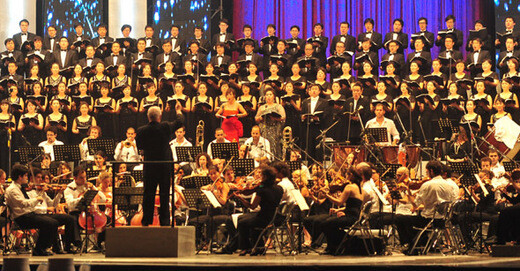hankyoreh
Links to other country sites 다른 나라 사이트 링크
Israeli-Palestinian orchestra brings reconciliation to Imjingak

By Kim So-min, Freelance Journalist
On the night of Korean Independence Day, the melody of the Beethoven’s Symphony No. 9 “Choral” rang out from Imjingak, the place that symbolizes the division between North Korea and South Korea. International classical conductor and pianist Daniel Barenboim, 69, led the joint Israeli-Palestinian West-Eastern Divan Orchestra (WEDO) on the night of Aug. 15 at the “2011 Peace Concert” at Imjingak in Paju, Gyeonggi Province.
With an audience of around 10,000 fully occupying the seats at the specially constructed venue, the concert began 25 minutes after the scheduled time of 7 p.m. Barenboim and around 100 members of the WEDO, taking the stage in somewhat hazy weather, played through the ninth symphony, moving in a solemn fashion. The “Choral,” Beethoven’s final symphony, is a masterpiece composed after he had lost his hearing. It contains a message of harmony among all people.
Until the end of the second movement, the orchestra appeared stiff, as if it had not adapted sufficiently to the outdoor environment, but from the third movement it moved freely through the melody. Barenboim displayed his heavy-lined, clear conducting style throughout the performance. During the finale of the fourth movement, in particular, when the “Ode to Joy” began, the approximately 100 members of the orchestra and the 120 members of the choir came together in harmony and drove the symphony to its climax, making the energy tangible. The audience, entranced when the performance ended, responded with five or six curtain calls and gave a standing ovation to Barenboim, who had come down from the conductor’s rostrum looking worn out.
The performance featured leading Korean soloists such as soprano Jo Su-mi, mezzo-soprano Lee Ah-kyung, tenor Park Ji-min and bass Maurice Ham, as well a choir that combined the National Chorus of Korea, Goyang City Choir and Seoul Motet Choir.
WEDO was formed in 1999 by Barenboim, who holds both Israeli and Palestinian citizenship, and the late English literature scholar Edward Said (1935-2003). After giving its first concert in Ramallah, the administrative capital of the Palestinian National Authority, which could be described as the tinderbox of the Middle East, it has toured various places around the world, including conflict regions, spreading a message of peace. The maestro’s message of overcoming problems that cannot be solved politically or economically through music, and realizing love among mankind, has moved people around the world. Barenboim has reportedly also been earmarked to receive a Nobel Peace Prize in recognition of these services.
It appears, however, that the “white noise” that was heard around the time of the concert will leave Korean fans with somewhat uncomfortable memories. Before the Imjingak Peace Concert, Barenboim conducted all of Beethoven’s symphonies over four days at the Seoul Arts Center in Seocho neighborhood, on July 10, 11, 12 and 14.
However, contrary to expectations, reviews deemed the overall skill of the members of the WEDO to be inadequate. Barenboim, too, perhaps unsatisfied with the playing itself, has appeared sensitive. When one player made a mistake on the first day, Barenboim pointed the individual out and made a gesture expressing his displeasure; on July 14, during a performance of Symphony No. 2, he went backstage immediately after the first movement and protested at the lack of air conditioning, holding up the performance for 15 minutes, despite having set an appropriate temperature together with the center’s management in advance. This was the first time a performance had been stopped due to an air conditioning problem at Seoul Arts Center, Korea’s leading musical performance venue.
Please direct questions or comments to [englishhani@hani.co.kr]
Editorial・opinion
![[Editorial] Does Yoon think the Korean public is wrong? [Editorial] Does Yoon think the Korean public is wrong?](https://flexible.img.hani.co.kr/flexible/normal/500/300/imgdb/original/2024/0417/8517133419684774.jpg) [Editorial] Does Yoon think the Korean public is wrong?
[Editorial] Does Yoon think the Korean public is wrong?![[Editorial] As it bolsters its alliance with US, Japan must be accountable for past [Editorial] As it bolsters its alliance with US, Japan must be accountable for past](https://flexible.img.hani.co.kr/flexible/normal/500/300/imgdb/original/2024/0417/6817133413968321.jpg) [Editorial] As it bolsters its alliance with US, Japan must be accountable for past
[Editorial] As it bolsters its alliance with US, Japan must be accountable for past- [Guest essay] Amending the Constitution is Yoon’s key to leaving office in public’s good graces
- [Editorial] 10 years on, lessons of Sewol tragedy must never be forgotten
- [Column] A death blow to Korea’s prosecutor politics
- [Correspondent’s column] The US and the end of Japanese pacifism
- [Guest essay] How Korea turned its trainee doctors into monsters
- [Guest essay] As someone who helped forge Seoul-Moscow ties, their status today troubles me
- [Editorial] Koreans sent a loud and clear message to Yoon
- [Column] In Korea’s midterm elections, it’s time for accountability
Most viewed articles
- 1[Column] The clock is ticking for Korea’s first lady
- 2[Editorial] When the choice is kids or career, Korea will never overcome birth rate woes
- 3[Guest essay] How Korea turned its trainee doctors into monsters
- 4[Editorial] As it bolsters its alliance with US, Japan must be accountable for past
- 5S. Korea, Japan reaffirm commitment to strengthening trilateral ties with US
- 6Korea, Japan jointly vow response to FX volatility as currencies tumble
- 7Gangnam murderer says he killed “because women have always ignored me”
- 8Japan officially says compensation of Korean forced laborers isn’t its responsibility
- 9[News analysis] After elections, prosecutorial reform will likely make legislative agenda
- 10‘Right direction’: After judgment day from voters, Yoon shrugs off calls for change